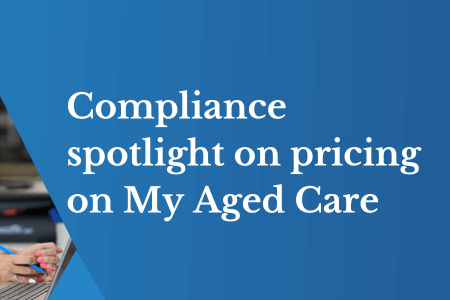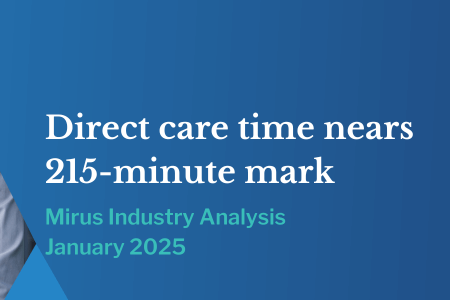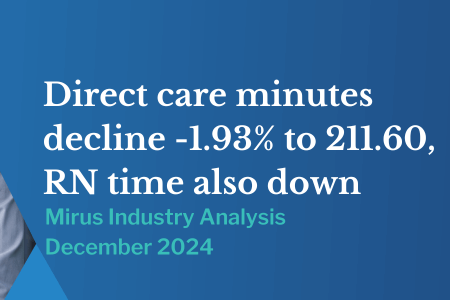The top 10 frequently asked AN-ACC questions
October 6, 2022 | AN-ACC

At our most recent webinar, we set the scene with the most frequently asked AN-ACC questions that we get from clients regularly. Here are the top 10 questions and answers!
- Do we have to pay for reclassifications if unsuccessful or if no change?
The answer is no, the Department of Health and Aged Care have told us that they’re not planning on charging. There is a mechanism in the legislation to allow them to charge but there is no intention to charge anybody for any of the reclassifications as long as there is fair use. - Can we include allied health, lifestyle, catering, etc. in care minutes?
The answer is no. The definition goes back to the Royal Commission definition in recent weeks and so it’s really RN, EN or care worker time. The caveat to that is that personal care time – e.g. feeding support, cleaning, dressing, washing, all of those personal direct care items – may be delivered across roles in your facility but may not be called care workers. You need to look for those extra minutes that might be trapped even if the roles have a different name. - What is the expectation of how quickly an external assessor will be at our site?
28 days. There are over 300 assessors nationally with capacity to provide 200,000 assessments per year. The Department of Health and Aged Care have told us that there’s plenty of capacity to allow for basically reclassification anytime but you should see an assessor on site within 28 days. Of course, regional places, remote places might have some variation to that but the norm is 28 days. - Can we reclassify at any time?
Yes. There are some guidelines around it but certainly the question of hospitalisation or big mobility changes or waiting 6 months or 12 months have been lifted. You should be able to use the reclassification processes and the free form text to ask for a reclassification anytime you feel like the clinical requirements or care needs have changed. That works for needs going up and down, so just to be clear on that. - Will the ACAT process still work in the same way, especially for respite?
Yes, ACAT is not changing at this stage. That’s working in the same way. You can’t have anybody assessed before they come into your facility (other than Class1) so assessment for AN-ACC happens once the resident is in the facility.
For respite, anyone who’s assessed for a low or high respite will move onto the 101 and 102. Anyone who’s 103, you’ll need to get them reassessed through a DEMMI to get them into the higher level of mobility to be a 103. But anyone who has an existing respite at low and high should move automatically into a 101 in the 102. Everybody else is going to be assessed for AN-ACC once they are in your facility unless they are palliative on entry which is classification 1, and there’s a new process for that as many of you would know now. - Will a resident be assessed for AN-ACC before they come into the facility?
No. A resident will be assessed once they’re in your facility other than Class 1. - Do I have to change my care plans to include AN-ACC assessments?
No. There’s very much an intention to disconnect the AN-ACC assessments, the external assessments relating to funding and your care planning. It’s a really great opportunity for the industry to really focus on care and care planning separately to funding and the AN-ACC assessments. Obviously, there’s a need to connect those two in the information in the care system that supports the external assessment but no need to directly change your care plans and assessments at this point in time. - Can EN minutes be included as RN minutes?
No, not at this stage. In the conversations we’ve had with the DoHAC they have said that they are considering lots of different options and models and changes – however there was a very specific recommendation of the Royal Commission that RN minutes be RN minutes and RN minutes only. It’s a very specific qualification, it’s different to enrolled nurses in its scope and its registration and so at this stage at least, although they are still looking at it, EN minutes are not RN minutes. They are also considering various types of concessions in regional locations but at this stage EN minutes are not RN minutes and EN minutes can only be included in the total care minutes. - Will there be any consequence to not meeting care minutes in first 12 months?
Arguably the answer to that is no, but of course there is the star rating. So the star rating is going to incorporate care minutes and a weighting of approximately 25% we think at this stage. We’re still waiting for details on that algorithm but the star ratings are scheduled to be published in December.
While care minute compliance is not mandatory until October 2023, the quarterly reporting that you’re just about to do for the first time is going to quote care minutes and that will be available to the Department and available to the Quality Agency. On the recent webinar hosted by the DoHAC, they also confirmed that when they publish the star rating at the end of this year their intention is to publish your care minute target and your care minutes. So in one sense they’re not mandatory but in another sense, they are potentially going to be published.
- Will the Government release the algorithm or assessment data in future?
No, they have no intention of releasing any information about the algorithm or the assessment data and process in future. It is intended to be an independent part of the process and they would like to keep it that way so we’re not expecting to get any more information other than what we can gather from going back to the original Wollongong University Resource Utilisation and Classification (RUCs) study.
Was this helpful? Did we miss any questions? Get in touch and we’ll answer your questions.


